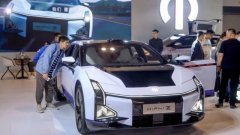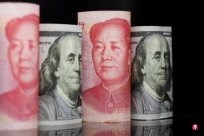Source: Bloomberg
Author: Christopher Condon
Chinese officials listened to the main information conveyed by Jennite Yellen in the past few days: Beijing's vigorous promotion of manufacturing threatened other economies.But enthusiastic entertainment may not mean that Beijing will meet her requirements for industrial policy steering.
The four -day visit to the US Treasury Minister revisited the original intention of her trip at the press conference: emphasizing that the global economy will be adversely affected by the surge in exports of China's manufacturing industry, and Beijing needs to pay more efforts to come to come to come to come to come to work hardPromote domestic demand.
"This is a vital issue, and if we do not find a solution, it will have a adverse impact on American workers and companies in the United States," said reporters to reporters in Beijing's US ambassador's official residence, "I amThe work here is to ensure that I have explained very thoroughly on this issue and put forward this concern to the top leadership of China.
The voices of the United States are not completely opposed to China's goals.Not long ago, Beijing also pointed out that some industries have overcapacity, but they seem to think that this problem will be digested by market forces over time, so there is no need to turn on economic policyCall the manufacturing growth.
"They realize that excess capacity is a problem, but I don't think they really have the motivation to lower the price," because it will damage the profits of Chinese enterprises, Alfredo Montufar-HELU said.
In Montufar-Helu, two key factors determine that China's policy of stimulating manufacturing is unlikely reversing: the real estate market plunge and the United States' technology curb.He said that China will continue to pursue technical self -reliance, "this is determined by the geopolitical pattern."
Liao Yan, deputy minister of China Finance, said at a media blower on Monday that the solution of the imbalance of supply and demand "mainly rely on the market to adjust in accordance with the value of value."This statement implies that Beijing believes that eliminating losing companies through bankruptcy and mergers can eliminate overcapacity.
New Industry
Liao Yan also refuted Yellen's statement of excess capacity in China's solar energy and electric vehicles."The current capacity is far from meeting market demand, especially the potential demand for new energy products in many developing countries," he said.
Yellen emphasized that the surge in the production of Chinese electric vehicles and batteries has worried the United States and many other countries, and the shift from exports will also benefit China.
China may think that the criticism of the United States is not kind.Beijing has repeatedly stated that the United States is adopting a cold war -type approach to attempt to curb its economic development.Official media said that excess capacity is said to hide "unable to try" for Chinese high -tech companies.
In public, Most of Yellen has repeatedly emphasized that China should change the trend of economic policy.
At a press conference on Monday, a Chinese reporter asked Yelun's suggestion to Beijing because local governments would worry about slowing investment threat employment.
"There is a supply side and a demand," she said. "One possible way is to boost demand and increase the proportion of the residential department in GDP."
Senior officials of the Ministry of Finance said Yellen encouraged this approach in her meeting with China.When talking with the Deputy Prime Minister of the State Council He Lifeng, she suggested that China can stimulate domestic expenditure by strengthening retirement protection and reducing the burden of education.



